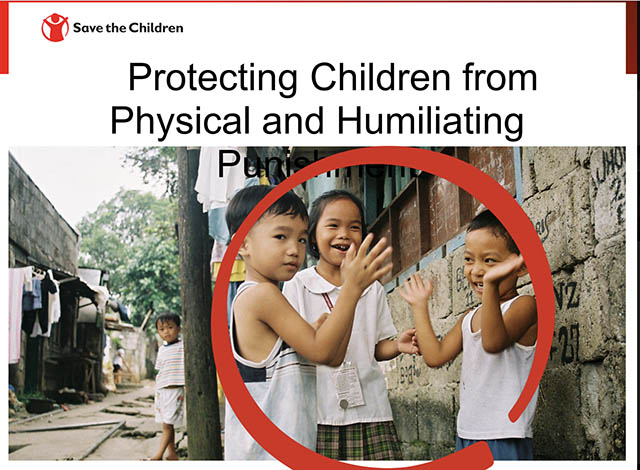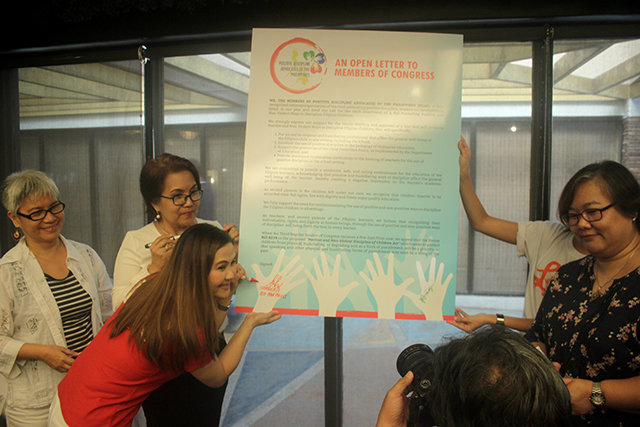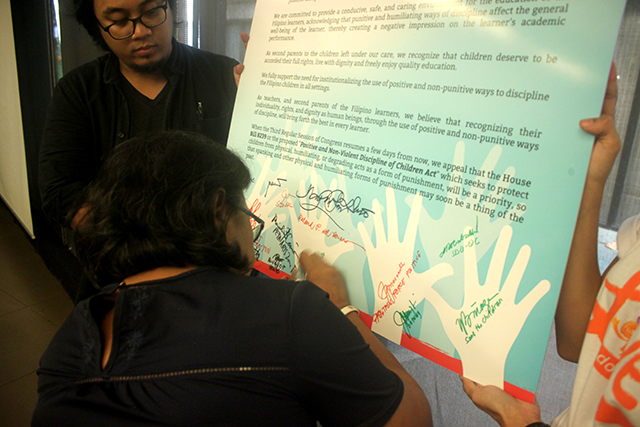A demand for urgent legislation of Positive and Non-Violent Discipline Bill
There is urgent need for stakeholders to come together in promoting positive discipline through the launching of a petition to gain pronounced support from the public in the advocacy for the positive discipline of children.
Child abuse can happen right inside the classroom. Twelve years ago, Mabel, a 9 year old girl from Silangan Elementary School, in Taguig died after allegedly being made to swallow pencil shavings by her teacher. According to her classmates their teacher thought Madel was the one who had scattered pencil shaving and was punished for it. Although there was no autopsy, acute tonsillitis and asphyxiation pneumonia due to the extreme swelling of throat were stated as the official cause of death.
This is just terrible. While the behavior of some children may be particularly trying to ones patience, teachers are expected to look into the possible cause or causes of their misbehavior and to act accordingly. She said teachers should consider conferring with parents of misbehaving children as first recourse rather than a first remedy. In no way should teachers own personal problems, emotional outbursts or psychological baggage affect their mode of disciplining their pupils.

The educators group Positive Discipline Advocates of the Philippines (PDAP), along with the support of positive discipline advocate groups such as Save the Children and Philippine Educational Theater Association (PETA), held a press conference on November 8, Thursday, to call for an end to physical and humiliating punishment against children and to demand for the legislation of the Bill Promoting Positive Discipline.
Formed in 2012, PDAP is an independent organization of teachers and school officials that actively promotes the concepts and principles of positive discipline to ultimately institutionalize it within the public education system. The bill Promoting Positive and Non-Violent Ways to Discipline Filipino Children, is currently on its 3rd and final reading at the Senate and on its 2nd reading at the House of Representatives.
“PDAP believes that as ‘second parents’, teachers and educators play an important role in fulfilling the right of children to protection, specifically, in ensuring that they are disciplined in a positive manner,” the group stated. “With the recent developments of the passage of the Bill Promoting Positive and Non-Violent Ways to Discipline Filipino Children in the Senate and House of Representatives, PDAP urgently calls for its eventual passage by our policy makers.”
PDAP founder and Judge Feliciano Belmonte Sr. High School Principal Ms. Zaida Padullo explained the significance of positive approach in helping and supporting students who are going through struggles. “If a student is treated aggressively, the student would rebel. But if treated with empathy, compassion, and understanding, they would open up and unload their real problems,” she shared. Members of PDAP from different Division of City Schools also gave testimonials to further show the positive effects of positive discipline on children’s personal development and academic success.
During the launch, the international children’s organization, Save the Children provided context as to why positive discipline must be practiced instead of corporal punishment. Save the Children cited the National Baseline Study on Violence against Children that shows how punitive and humiliating approach in disciplining children is detrimental to their mental, emotional, and psychological well-beings.
Meanwhile, PETA-Advocate Right to Safety Zone (PETA-ARTS Zone) Program Manager Marichu Belarmino-Carino also shared their group’s cultural campaign towards the promotion of Positive Discipline. Arts Zone is an advocacy campaign by PETA that champions children’s rights and upholds their right to protection from all forms of violence with the help of creative interventions.
“We, at the PETA-ARTS Zone, believe that the power of theater and arts to spark reflection and raise consciousness can create strong impact on changing existing beliefs, values, and practices of FIlipinos such as inflicting pain to teach discipline, and to facilitate a process that replaces Corporal Punishment with Positive Discipline,” she said.
Children’s Rights Champion Rep. Bernadette Herrera-Dy of the Party-list, BH, and author of House Bill 516 (the Positive and Non-violent Discipline of Children Act) was also present at the launch to give updates on the bill and to narrate the legislators’ efforts on the advocacy. Congresswoman Dy has been a staunch supporter of Positive Discipline. “Corporal punishment is ineffective in disciplining children of all ages. Most often, it produces anger, resentment, and low self-esteem among children. It also teaches the child that violence is an acceptable behavior and is a solution to problems; thus, corporal punishment perpetuates itself as children imitate the actions of adults,” she explained in her previous statements.
Positive discipline, which the bill promotes, is opposed to any pain — physical, emotional, psychological — inflicted on children as a form of discipline. Parenting experts and psychologists have studied the effects of such forms of punishment on children. These include long-term effects such as aggression, delinquency, and mental health problems. But in a country like the Philippines, where corporal punishment such as spanking and kneeling on monggo seeds or salt are considered to be a form of discipline with love as its justification, it is more difficult for positive discipline advocates to push for a law that requires a change of culture among Filipino families, especially with arguments such as, “I was spanked and I turned out fine” thrown at them.

Marichu Belarmino of PETA said, “Not every child has the same coping mechanism when it comes to pain. Some people who underwent corporal punishment might have turned out fine but some have not. It is dangerous for children to equate love with pain as it gives precedence to future abuse that they might go through. It will only be an endless cycle of abuse. We need to find better ways to show children that love does not hurt. Ultimately, we need to find ways to become better parents.”
PDAP’s Ms. Zaida Padullo added, “Inflicting violence to children as a form of discipline should no longer be tolerated in our homes and in our schools. There needs to be a law that protects children from being harmed by their parents or teachers. This should no longer be a domestic issue inside the family where no one can intervene but rather an issue of children’s rights.” This November, the country celebrates ‘Children’s Month’ with the theme, “Isulong: Tamang Pag-aaruga Para sa Lahat ng Bata, [Nurturing Children the Right Way].”
There is urgent need for stakeholders to come together in promoting positive discipline through the launching of a petition to gain pronounced support from the public in the advocacy for the positive discipline of children. The launch concluded with the stakeholders signing an open letter addressed to legislators.
The open letter stated, “As teachers, and second parents of the Filipino learners, we believe that recognizing their individuality, rights, and dignity as human beings, through the use of positive and non-punitive ways of discipline, will bring forth the best in every learner. We, therefore, as an organization of committed teachers in advocating positive discipline, implore our lawmakers to listen to our plea and heed our call for the swift enactment of a Bill Promoting Positive and Non-Violent Ways to Discipline Filipino Children.”


